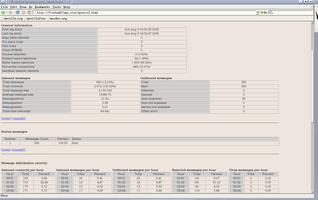| Option | Purpose |
| -h | print a short help |
| -V | print a version |
| -v | more detail info ouput |
| -c config | use this file as configuration (default=/etc/mail/milter-agent.conf) |
| -p pipe | local socket (Unix domain socket) to data exchange with sendmail (default=unix:/var/spool/milter-agent/sock) |
| -i socket | local socket (Unix domain socket) to data exchange with user (default=unix:/var/spool/milter-agent/cmd) |
| -t timeout | operations timeout fpr socket sendmail (default=0) |
| -u user | user's name, which rights will be used by milter-agent (default=_milter-agent) |
| -l vlevel | level of debugging print (default=0) |
| -d mode | working mode (0=daemon,>0=debugging terminal) |
| -m err_level | errors threshold during external programs and internal modules running (default=0) |
| -A | allow to add recipients for message |
| -R | allow to remove recipients for message |
| -H | allow to add service headers for message |
| -G | allow to change service headers for message |
| -B | allow to change a message's body |
| -a | use a blocking access for configuration |
| -C | close all open files on external program running (after fork, before exec) |
| -E | stop on any error |
| -F | dynamic control of configuration change |
| -T | allow to terminate an external program after timeout expiration |
| -M | allow to terminate an internal module after timeout expiration |
| -X | enable the support of regular expressions (POSIX.2) |
| -I | poutput info about temporary file (for archive systems) |
| -1 | enable all these options -ARHGITMX (for more simple configuration) |
| -Q | use last recipient in list for message processing (default=first from list) |




